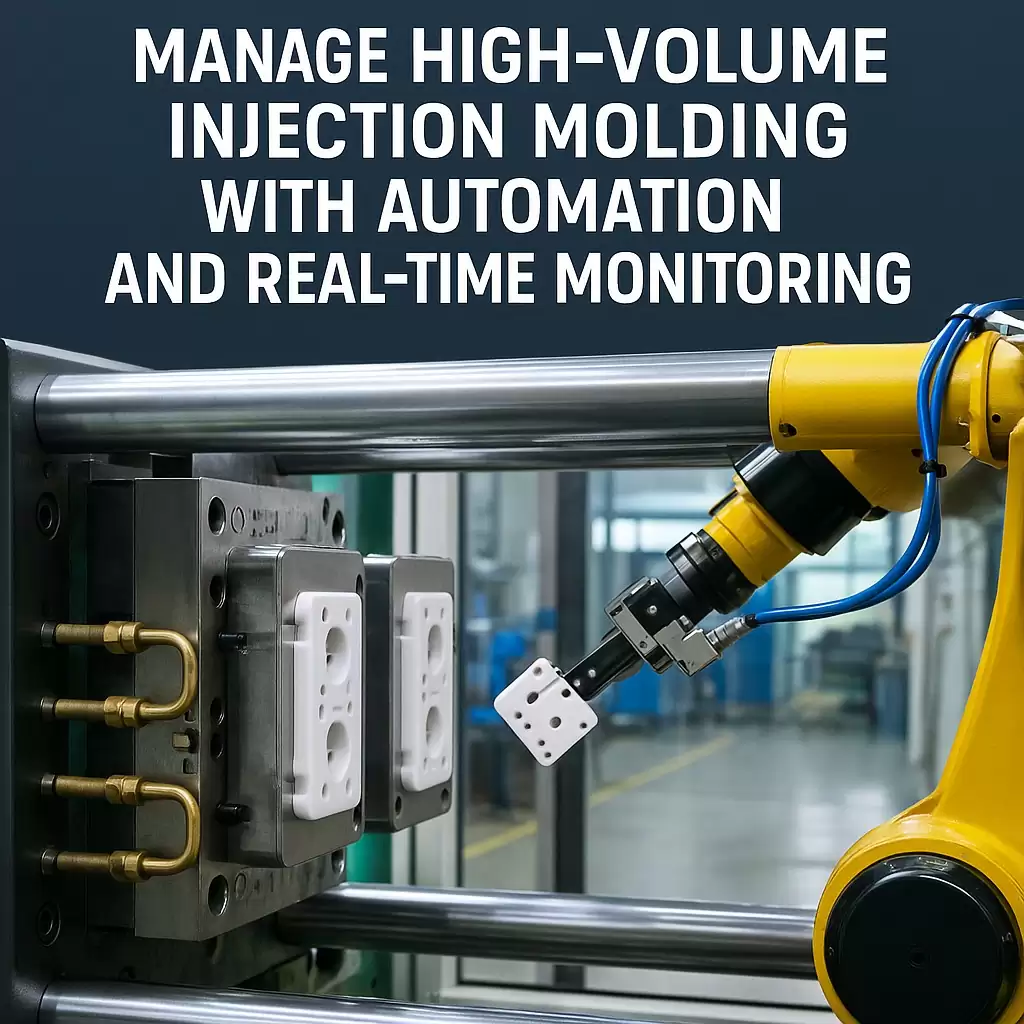Manage High-Volume Injection Molding with Automation and Real-Time Monitoring
Manage High-Volume Injection Molding with Automation and Real-Time Monitoring
When annual demand climbs into the hundreds of thousands or millions, success depends on more than press tonnage. You need repeatable automation, sensor-driven process control, and live production data to keep cycle time, scrap, and delivery performance on target. At TaiwanMoldMaker.com, we build workcells that do exactly that—so you can manage high volume injection molding with automation and real-time monitoring from day one.
1) What Automation Delivers at Scale
| Automation Layer | What It Does | Why It Matters for High Volume |
|---|---|---|
| 6-Axis & SCARA Robots | Fast demold, insert loading, in-cell stacking | Lower cycle time, stable handling, fewer operators |
| Modular EOAT | Quick-swap grippers, vacuum sensing | 60-second changeovers across SKUs |
| Inline Finishing | Pad print, laser mark, ultrasonic weld, leak-test | One clamp cycle → finished part, fewer freight legs |
| Conveyors & AGVs | Automated bin change & WIP transfer | Prevents line stoppages, improves OEE |
| Vision SPC | 100% cosmetic and dimensional checks | Catches defects at the cell, not at the dock |
2) Real-Time Monitoring: Data That Prevents Scrap
Our MES streams shot-by-shot data to your browser/API:
-
Cavity pressure curves & V/P transfer for scientific-molding control
-
Cycle time, shot weight, hold pressure trend charts with alert thresholds
-
OEE breakdown (availability, performance, quality) with downtime codes
-
Material genealogy (resin lot → cavity ID → carton) for traceability
-
Energy per kg to track sustainability KPIs
Result: deviations are detected within minutes, not at weekly reviews.
3) Cell Architecture for Million-Shot Programs
-
Valve-Gate Hot Runner (balanced manifold, sequential control)
-
Conformal-Cooled Inserts (cut 15–30% out of cooling time)
-
Closed-Loop Press Controls (repeatable clamp & injection profiles)
-
Robot + Vision + Inline Test (no manual handling)
-
MES Edge Device (local buffering → cloud dashboard/API)
4) Process Assurance You Can Audit
-
Mini-DOE at T-0 to lock a robust process window (CpK ≥ 1.67 at CTQs)
-
First-Article Pack: blue-light scan/CMM, GR&R, color ΔE, adhesion/torque tests
-
Validation: PPAP or IQ/OQ/PQ—including work instructions and control plans
-
Certifications: ISO 9001, IATF 16949, ISO 13485, AS9100 across partner sites
5) Throughput & Cost Impact (Typical)
| KPI | Before Automation | Automated + Monitored Cell |
|---|---|---|
| Cycle Time (ABS housing) | 28.5 s | 21.8 s |
| Scrap Rate | 2.9 % | ≤ 0.9 % |
| Labor / Cell | 2 operators/shift | 0.5 operator/shift (attended) |
| OEE | 68 % | 88–92 % |
| Energy (kWh/kg) | 0.65 | 0.45 |
Actuals vary by part geometry, resin, and tooling.
6) Case Snapshot — Consumer IoT Enclosure, 16-Cavity Hot Runner
-
Volume: 1.2M units/year Resin: PC/ABS V-0
-
Upgrades: robot demold, in-cell laser marking, vision SPC, MES alerts
-
Outcome (6 months):
-
Cycle: 24.2 s → 18.9 s (-22%)
-
Scrap: 3.4% → 0.8%
-
PPM: < 350 sustained
-
Launch pulled in by 5 weeks; unit cost down US$0.09
-
7) Engagement Roadmap (Friction-Free)
-
Upload CAD & volume tiers → receive a 48-Hour DFM Pack (gate/cooling plan, cycle model, automation concept, cost ladder).
-
Pilot fast with aluminum bridge tooling (10–15 days to T-0) to validate automation fixtures and vision checks.
-
Scale to steel (H13/S136 multi-cavity) with copy-cavity and finalized EOAT/vision recipes.
-
Go live with MES dashboards (CpK/OEE/energy), API to your ERP/MRP, and clear SLAs.
8) Built-In Risk & Cost Controls
-
Dual-plant capacity (Taiwan + SE Asia) for surge coverage and continuity
-
Service-weighted billing options to reduce duty exposure on the tangible tool value
-
Preventive maintenance pegged to cycles/amp draw, not calendar guesses
Quick Links
-
✔️ Mold Service
-
✔️ Molding
Ready to Run High Volume with Confidence?
Request an Instant Quote
We’ll map your part to an automated, monitored workcell—and deliver production-grade parts with the speed, consistency, and transparency your program demands.









